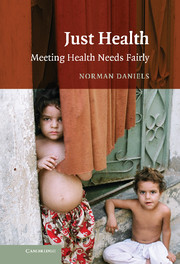Book contents
- Frontmatter
- Contents
- Acknowledgments
- Introduction
- PART I A THEORY OF JUSTICE AND HEALTH
- PART II CHALLENGES
- PART III USES
- 9 Fairness in Health Sector Reform
- 10 Accountability for Reasonableness in Developing Countries
- 11 Reducing Health Disparities
- 12 Priority Setting and Human Rights
- 13 International Health Inequalities and Global Justice
- References
- Index
10 - Accountability for Reasonableness in Developing Countries
Two Applications
Published online by Cambridge University Press: 05 June 2012
- Frontmatter
- Contents
- Acknowledgments
- Introduction
- PART I A THEORY OF JUSTICE AND HEALTH
- PART II CHALLENGES
- PART III USES
- 9 Fairness in Health Sector Reform
- 10 Accountability for Reasonableness in Developing Countries
- 11 Reducing Health Disparities
- 12 Priority Setting and Human Rights
- 13 International Health Inequalities and Global Justice
- References
- Index
Summary
Being accountable for the reasonableness of our decisions about limits in health policy requires us to develop an account of the reasons that fairminded people can agree are relevant to meeting their health needs. It requires us to publicize the grounds for those decisions while viewing them as revisable in light of new evidence (see Chapter 4). Does this approach to priority setting, originally developed by examining decision-making processes in the decentralized and private U.S. medical insurance context, have more general applicability? Can it apply where it may be most urgently needed, in developing countries with the most dramatic resource allocation questions?
My goal in this chapter is to show that accountability for reasonableness provides a way of establishing legitimacy and fairness in two different developing-country contexts in which resources are severely limited. First, I shall describe the way in which accountability for reasonableness can address moral controversies about patient and site selection in the global effort to scale up ARTs for HIV/AIDS in low-income, high-prevalence countries. Then I shall describe how accountability provides a framework for introducing a fair, deliberative process in determining the benefit package in the new Mexican catastrophic insurance plan. That scheme is part of Mexico's recent national health reform, the Seguro Popular, aimed at incrementally providing universal coverage to a previously uninsured and underserved half of the Mexican population (Frenk et al. 2006).
- Type
- Chapter
- Information
- Just HealthMeeting Health Needs Fairly, pp. 274 - 296Publisher: Cambridge University PressPrint publication year: 2007
- 1
- Cited by



